WHAT IS INCOME EQUALITY AND HOW DO WE MEASURE IT?
Income is money that is earned from doing work or received from investments. In most cases, individuals earn income through wages or salary. Income can also come from interest on a savings account, dividends from shares of stock, rent, and profits from selling something for more than you paid (inequality.org, n.d.)
Income inequality refers to the extent to which income is unevenly distributed across a group of people (The Equality Trust, n.d.) It can also be defined as the gap size between the richest and poorest members of society: The wider the gap, the greater the inequality (George et al., 2016.)
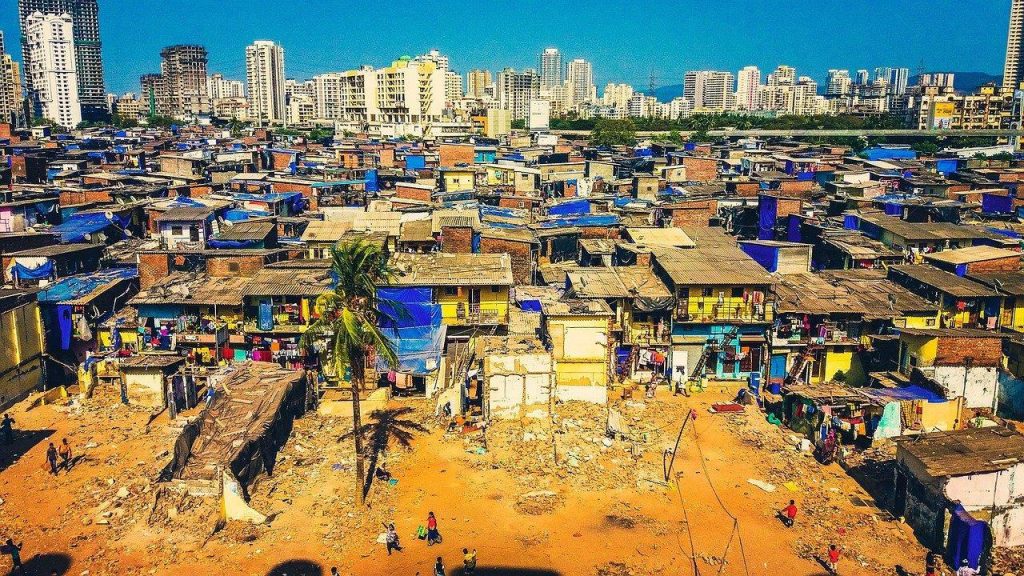
According to these definitions, income equality can be measured by comparing the income of the richest and poorest members of a study area. For instance, how rich is the richest 20% of the population when compared to the poorest 20%. It can also be measured with more sophisticated tools, such as the Gini Coefficient, which quantifies inequality across the whole group rather than just the extremes. “Values of the Gini coefficient range between 0, in the case of perfect equality, where each person gets the same income, and 1, in the case of perfect inequality, where all income goes to the share of the population with the highest income”, (Organization for Economic Co-operation and Development, 2011).
IS INCOME EQUALITY A REALITY IN OUR SOCIETIES?
The reality is that inequality within countries is very high. Since 1990, income inequality has increased in most developed countries (United Nations, 2020.) For instance, according to Inequality.org, the income gap between the rich and the rest has been growing markedly for more than 30 years in the United States (inequality.org, n.d.) In 2018, a staggering 0.1% of the population gained 196 times the income of the bottom 90% (Saez, 2018.)
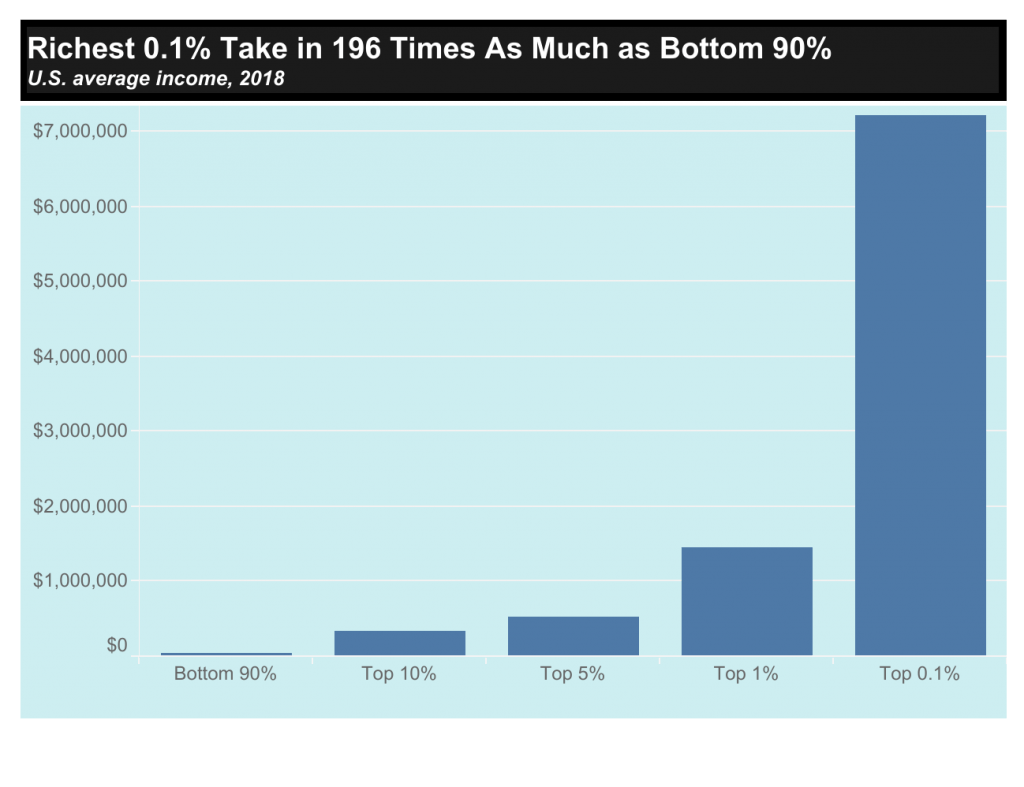
If we consider the global population, income inequality is also very high. In 2013, the richest 10% gained 30 times the income of the poorest 10% (Roser, 2013). However, the 2020 income data reveals that Latin America and the Middle East were the most unequal regions, with the top 10% of the income distribution capturing 54% and 56% of the average national income, respectively (World Inequality Database, 2020).
As expected, the Gini coefficient of the countries revealed that they all have a degree of income inequality, where some are higher than others. Hence, the purpose of this article is to investigate the link between income equality and social wellbeing. Where there is higher inequality, is there also a greater incidence of social problems?
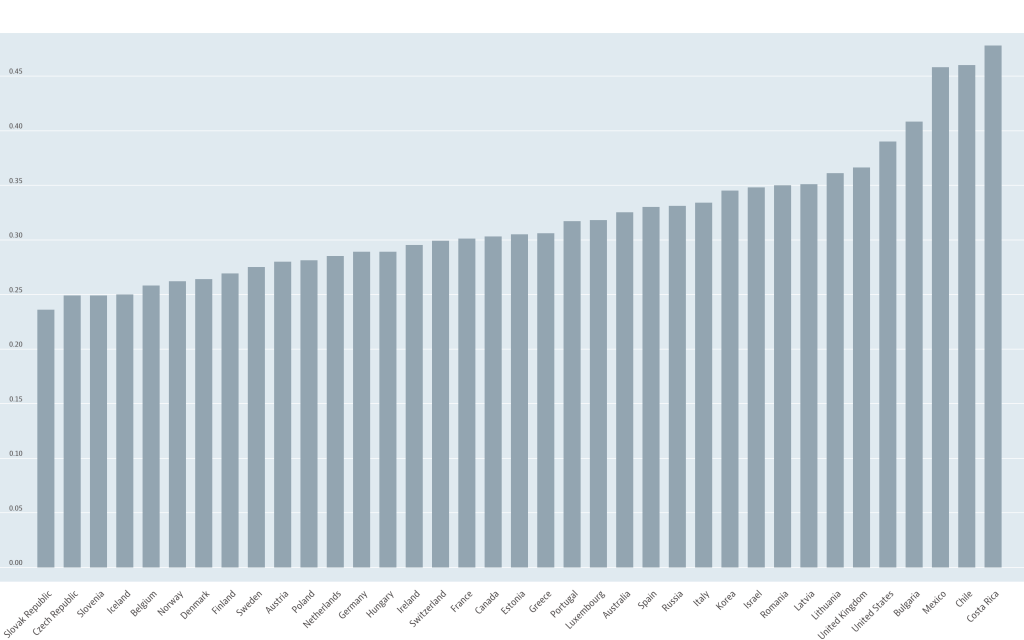
IS THERE A CORRELATION BETWEEN INCOME INEQUALITY AND SOCIAL PROBLEMS?
“Many people have a strong personal belief in greater equality and fairness, but these values have remained private intuitions, which they fear others do not share. The advantage of the growing body of evidence of the harm inflicted by inequality is that it turns what were purely personal intuitions into publicly demonstrable facts”.
(Wilkinson & Pickett, 2010)
In their UK bestseller book “The Spirit Level”, Professors Richard Wilkinson and Kate Picket provide evidence resulting from years of research that suggest many social problems are in correlation with income inequality:
CHILD WELLBEING
There are strong relationships between the United Nations Children’s Emergency Fund (UNICEF) index of child wellbeing and income inequality as well as the proportion of children living on less than half the average income in each country (Pickett & Wilkinson, 2007). This index measures indicators, such as children in families without an employed adult, deaths from accidents and injuries, achievement in reading literacy, children living in stepfamilies, being overweight, use of cannabis, bullying, and subjective wellbeing (UNICEF Innocenti Research Centre, 2007).
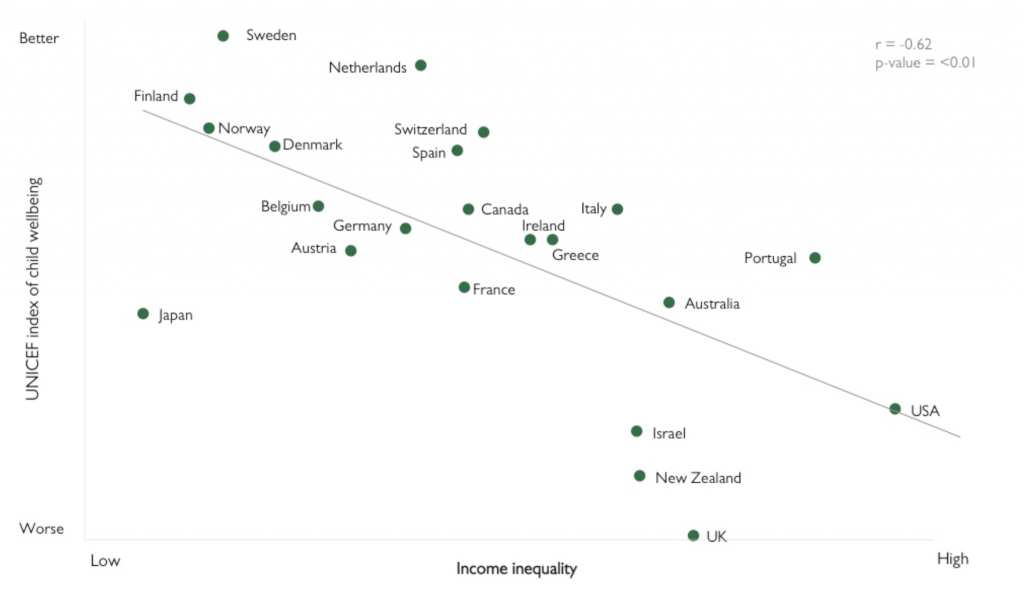
DRUG ABUSE
There is a strong tendency for drug abuse to be more common in more unequal countries, in which this index measures the prevalence of the use of opiates, cocaine, cannabis, ecstasy, and amphetamines.
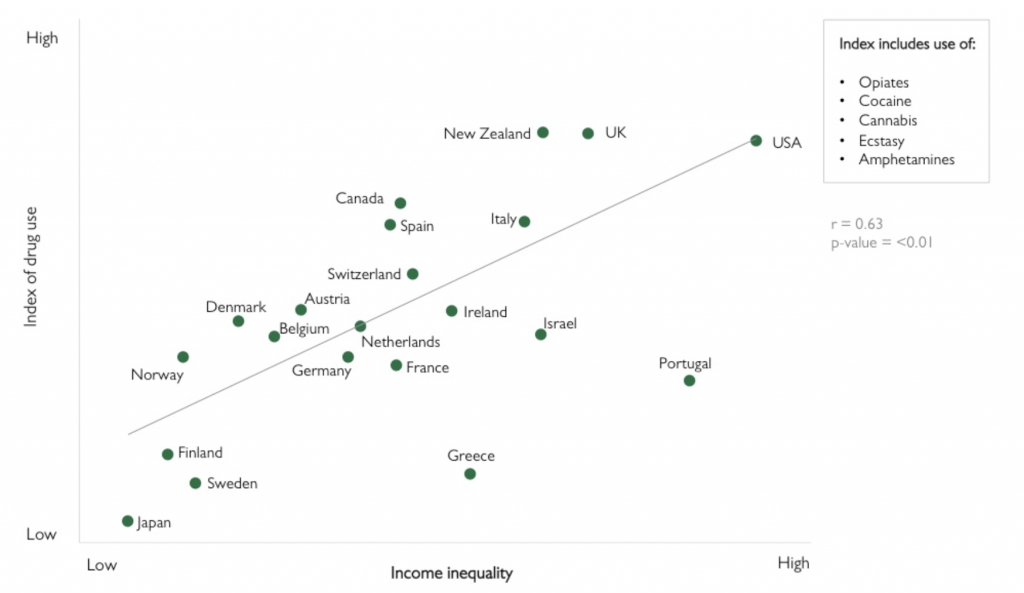
EDUCATION
Educational scores are higher in more equal countries. A comparison between the states of the USA shows that children are more likely to drop out of school in more unequal states (Wilkinson & Pickett, 2010). Similarly, another study reveals that income inequality affects both college enrollment and completion (Jackson & Holzman, 2020).
IMPRISONMENT
Crime rates, conviction rates, tendencies to give prison sentences rather than fines or community service, as well as the length of prison sentences influence the proportion of the population imprisoned, which is higher in unequal countries.
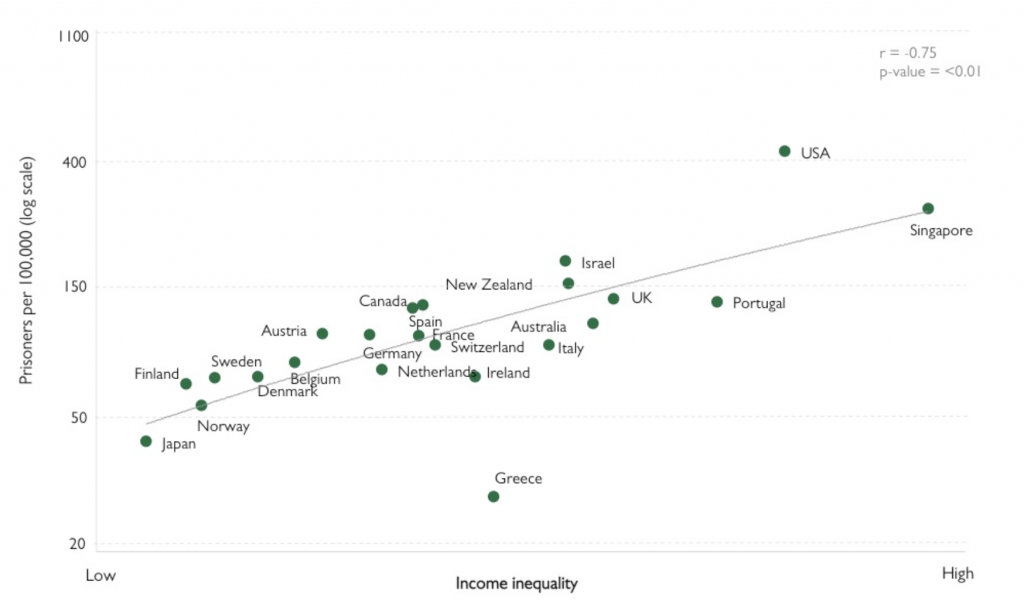
MENTAL HEALTH
A systematic review of 26 studies demonstrated a greater risk of depression in populations with higher income inequality (Patel et al., 2018). Hence, mental illness is more common in more unequal countries.
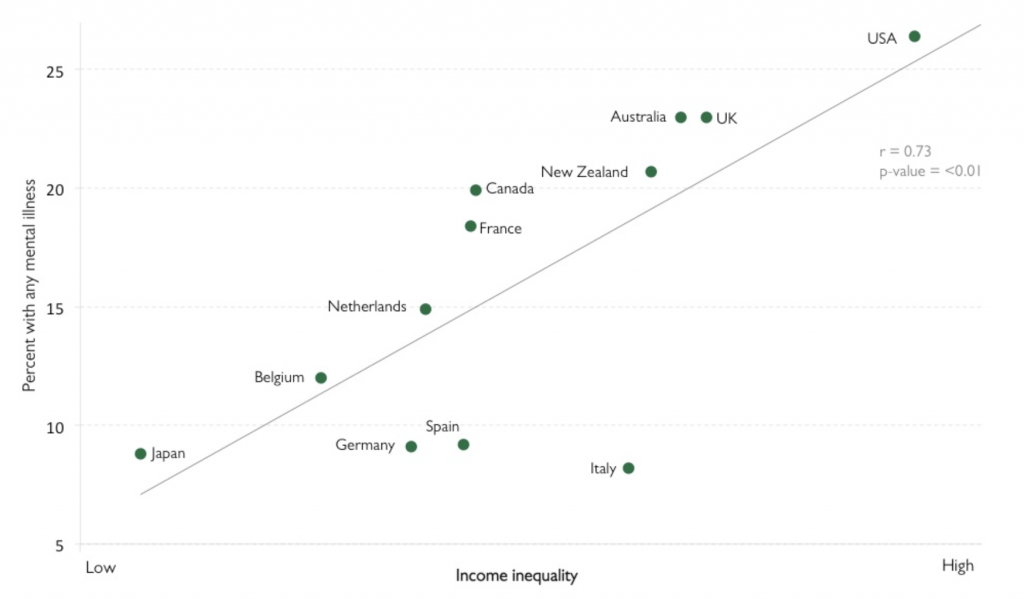
PHYSICAL HEALTH
A review of 170 academic papers revealed that various aspects of health are affected by income inequality, such as life expectancy, infant mortality, low birth weight, and self-rated health (Wilkinson & Pickett, 2006).
Obesity is also an indicator of this correlation. For instance, European countries with higher income inequality have higher levels of obesity, especially in children (Loring et al., 2014).
TEENAGE BIRTHS
Declines in teenage births are greater where income inequalities are lower, thereby reducing income inequalities is essential to prevent adolescent childbearing (Santelli et al., 2017). Teenage motherhood is also part of the inter-generational cycle of deprivation and social exclusion, where babies born to teenage mothers are more likely to have low birth weight, to be born prematurely, to be at a higher risk of dying in infancy. As they grow up, they are also at a greater risk of educational failure, juvenile crime, and becoming teenage parents themselves (Wilkinson & Pickett, 2010).
VIOLENCE
An indicator of violence within societies is homicide rates. Martin Daly, a professor emeritus of psychology at McMaster University in Ontario, explains that income gap predicts murder rates better than any other variable (Szalavitz, 2018). Inequality is also related to the Global Peace Index and to children’s experience of violence.
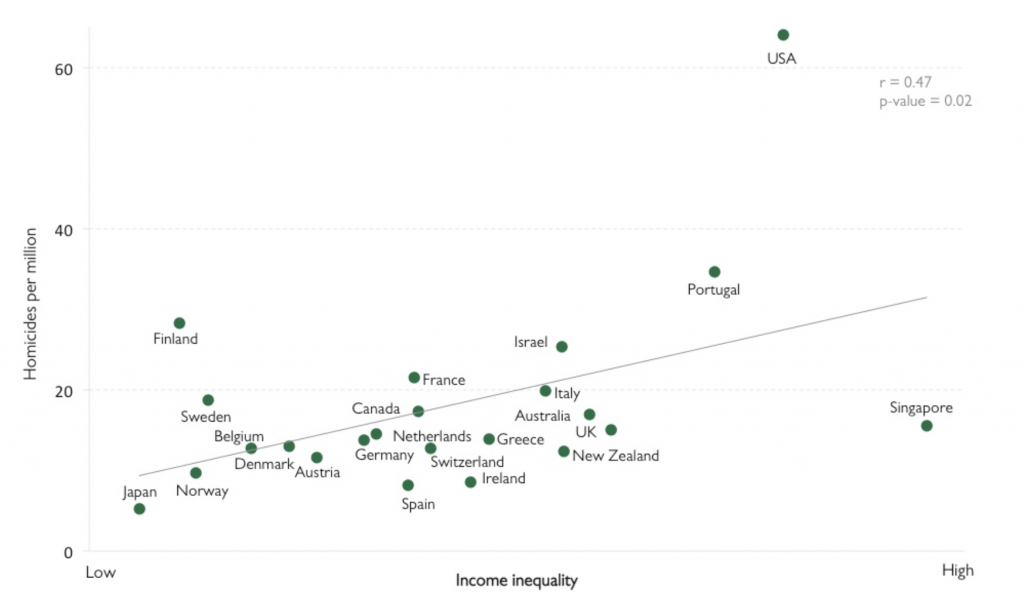
WHY DOES INCOME INEQUALITY HAVE THIS EFFECT IN OUR SOCIETIES?
The general supposition answering this question would be that unequal societies have more poor people, therefore, a higher presence of these social problems and that greater equality helps those at the bottom.
“The truth is that the vast majority of the population is harmed by greater inequality”.
(Wilkinson & Pickett, 2010).
Studies show that the benefits of greater equality are not confined to a minority or class, but they extend across the majority of the population. One explanation for this relationship are the psychosocial effects of inequality and how sensitive we are to them.
In societies where the income gaps are bigger, the social distances are bigger, social stratification is more noticeable, and that social structure affects the psychology of the individuals. Wilkinson and Pickett present some psychological affectations resulting from wider social gaps:
- Rise in anxiety about how we are seen and what others think of us, which can lead to an increase in depression cases.
- Rising narcissism as self-promoting insecure egotism, easily mistaken for high self-esteem, as a result of increasing anxieties on how we are perceived.
- This “social evaluative threat” is also related to stress in modern societies. Threats to self-esteem or social status provoke more cortisol changes than other kind of threats. Other important sources of psychosocial stress in modern societies include low social status, lack of friends, and a difficult early childhood, all of which are related to large income disparity.
Hence, these psychological affectations on the individuals contribute to a higher presence of the social problems that were aforementioned. In conclusion, higher income differences produce more differentiated social stratification, in which social problems are more common. Thus, large inequalities weaken community life, reduce trust, and increase violence.
WHAT CAN BE DONE?
A good start is to recognize that this problem is not about how wealthy a society is, but how equal it is. In rich countries, data has shown they have reached the end of what economic growth can do for them.
“Not only have measures of wellbeing and happiness ceased to rise with economic growth, but, as affluent societies have grown richer, there have been long-term rises in rates of anxiety, depression, and numerous other social problems”.
(Wilkinson & Pickett, 2010)
In the case of poorer countries, equality is ideal, but economic development is still important in the objective and subjective measures of wellbeing, such as life expectancy and happiness.
Moreover, economic growth is also unsustainable if we consider global warming and the environmental limits to growth. In addition, dramatic reductions in carbon emissions are needed to prevent the effects of climate change.
Consequently, our societies need to move their focus from increasing material wealth to the social environment and the quality of our social relations, if we want to improve our true quality of life. As the statistics presented show, reducing income inequality is paramount to achieving that improvement.
“Societies with smaller income differences between rich and poor are more cohesive: Community life is stronger, levels of trust are higher and there is less violence. The vast majority of the population seem to benefit from greater equality”.
(The Equality Trust, n.d.).
Although reducing income inequality heavily depends on policies taken by governments, we cannot wait for governments to do this for us. As with many other problems, we need a continued stream of small changes. We can start making equality a reality in our lives and in the institutions of our societies. This is the most important way to push our governments to implement policies that benefit the entirety of our societies.
As individuals, we can vote for parties that pledge to tackle inequality. Challenge decisions of our representatives that could worsen inequality. Join a trade union, countries with large and strong trade unions have lower inequality. Participate as an activist for equality. As a consumer, favor businesses that pay a real living wage, pay taxes, and treat workforces well. Move your money to ethical banks. Educate your kids about equality, and support non-selective educational institutions. Get involved in your community, meet your neighbors, promote interaction. Be responsible with your taxes.
Your actions are important. For more information on how THRIVE can support your actions, check our website, and if you want to know more about equality and other sustainability issues, read our blog.























